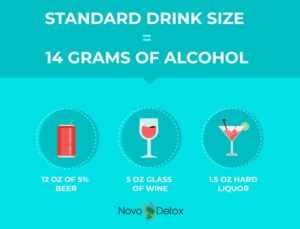Is it Bad to Drink Alcohol Every Day?

What Is Considered Excessive Drinking
Many are aware of the effects of binge drinking and alcohol abuse. However, how bad is drinking every day and in moderation for your health? At what point does heavy drinking become harmful to your health?
Standard drink size and alcohol intake recommendations differ between countries. In the U.S., a traditional drink contains about 14 grams of alcohol. This translates to the amount of alcohol found in a 12-ounce beer, 5 ounces of wine, or 1.5 ounces of hard liquor. U.S. Department of Health and Human Services dietary guidelines says moderate drinking involves up to one drink per day for women and up to two drinks per day for men.
Binge drinking is defined by the Substance Abuse and Mental Health Services Administration (SAMHSA) as four or more drinks for women or five or more drinks for men at the same time or within a couple of hours. Drinking heavily is defined as binge drinking on five or more days in the past month.
What Happens When you Drink Alcohol Every Day
Short-term effects of alcohol can include a negative impact on your physical and mental health. Daily drinking can lead to alcohol dependence and alcohol use disorder. Some other short-term effects it can have on your health include:
- It can throw off your gut bacteria and cause digestive problems
- Weight gain
- Increase sleep disorders
- Increased risk of heart attack or stroke
- Lowered immunity
- Poor Judgment
- Dizziness
- Confusion
- Increased blood pressure
- Mood swings
- Vomiting
- Drowsiness
- Poor judgment
- Difficulty concentrating
- Slowed reaction time
- Blurred or double vision
- Decreased body temperature
- Blacking out
Long-Term Risks of Excessive Drinking
Continued damage to the G.I. tract, kidneys, liver, heart, and vascular system from excessive drinking can cause several chronic diseases. Some of these can be irreversible once they are diagnosed. It is essential to treat alcohol addiction early to avoid some long-term health disorders.
Some health issues and health effects associated with chronic alcohol abuse
- Arrhythmias
- Liver diseases including fatty liver and cirrhosis
- Fibrosis
- Stroke
- Weakened immune system
- Anxiety and panic disorders
- Sleep disorders
- Irritability
- Depression
- Alcohol cravings
- Gout
- High blood pressure
- Pancreatitis
- Seizures
- Dementia
- Heart disease
- Various cancers (liver, colorectal, and breast cancer)
- Anemia
Signs of Alcohol Use Disorder
The signs of drinking too much alcohol can impact several facets of a person’s well-being over time. Some of the psychological, physical, and social symptoms of alcohol abuse include:
- Being unable to limit the amount you drink
- Not being able to cut down on drinking
- Spending a lot of time getting alcohol, drinking, or recovering from alcohol use
- Strong cravings for alcohol
- Reduced productivity in school or work because of excessive drinking
- Not participating in activities once enjoyed
- Using alcohol in unsafe situations, such as drinking and driving
- Tolerance to alcohol, so you need more to feel the effects
- Experiencing alcohol withdrawal symptoms when you stop drinking
- Continuing to drink despite it causing physical, mental, social, work or relationship problems.

Alcohol Treatment at Novo Detox
If you feel your or someone your drinking habits are becoming a problem and you cannot stop drinking, you may need alcohol use disorder treatment from alcohol rehab. At Novo Detox, our inpatient treatment for alcohol detox and alcohol rehab programs are customized to each client to help them overcome the various aspects of alcohol use disorder. Our dual diagnosis treatment program can help treat co-occurring disorders that are often present with alcohol addiction. The sooner you get help for alcohol addiction, the lower the risk of developing irreversible chronic health and mental disorders from alcohol abuse. Please give us a call at (844) 834-1777 to learn more today.




